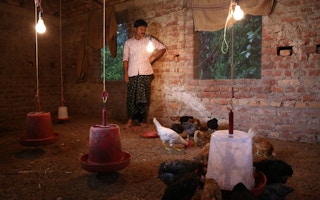A Bangalore-based technology start-up that converts the greenhouse gas methane into protein for animal feed has won an inaugural regional agri-tech and food-tech competition for young companies.
To continue reading, subscribe to Eco‑Business.
There's something for everyone. We offer a range of subscription plans.
- Access our stories and receive our Insights Weekly newsletter with the free EB Member plan.
- Unlock unlimited access to our content and archive with EB Circle.
- Publish your content with EB Premium.
String Bio is helmed by former Silicon Valley scientist Dr Ezhil Subbian, who started the company in San Francisco before bringing it home to India in four years ago.
The company walked away with a $100,000 grant from the first-ever Future Food Asia Award to further its business of converting methane to single-cell proteins via a fermentation process, a model that is low in operating and capital expenditure.
Said Subbian: “Methane is one of the cheapest sources of carbon in the market. Other solutions for sustainable feed require high capital, which is not a solution for the Asian market.”
In her pitch to the audience of investors, corporate representatives, non-governmental organisations and start-ups at the event last month, she said String Bio’s solution captured value for suppliers - natural gas and oil companies or smaller scale biogas producers that end up flaring methane generated.
Researchers have found that some 143 billion cubic metres of gas were removed this way in 2012, which represented 3.5 per cent of natural gas produced that year.
“
We need the brains of Asia to solve Asian problems.
Isabelle Decitre, chief executive officer, ID Capital
On the demand side, Subbian pointed out that industries such as aquaculture are struggling to find “non-contaminated, traceable protein” for feed. The solution has already been deployed, on a trial basis, on a few poultry farms in South India and the String Bio team is exploring the potential of aquaculture.
The United Nations Food and Agriculture Organization has said that global demand for animal protein will grow by 70 per cent by 2050. The world currently already uses one-third of existing arable land solely to produce livestock feed.
String Bio was one of eight start-ups to present to judges at the event. The finalists were chosen out of more than 100 entries from around the region from countries as far away as Israel, said Isabelle Decitre, chief executive officer of Singapore-based venture capital firm ID Capital.
Decitre, a French native who was formerly international marketing and communications director for Hennessy, told Eco-Business that Asia needs more innovative solutions to food production issues unique to the region.
The Future Food Asia Award is a “starting point” to scale up investments in the under-invested agri-tech sector, she said. Through the competition, she hoped to showcase Asian start-ups, encourage start-up driven innovation in Asia and raise awareness of the challenges in the food chain, such as post-harvest waste.
Agri-tech and food tech have not generally been regarded as an attractive domain for investors, and while agriculture makes up 10 per cent of global gross domestic product, only 3.5 per cent of venture capital funds internationally go towards agri-tech.
“My ambition is that in three years’ time, there will be more entrepreneurs (in Asia) thinking about agri-tech and food tech as a relevant domain to investors’ time and energy, because we need the brains of Asia to solve Asian problems,” she told Eco-Business.
Another five start-ups won a S$50,000 grant by SPRING Singapore, a statutory board under Singapore’s Ministry of Trade and Industry that grooms local enterprises. They are: Agrint (Israel/US), Hands Life Science (Hong Kong), Smart AHC (Singapore) and Sophie’s Kitchen (Taiwan).








